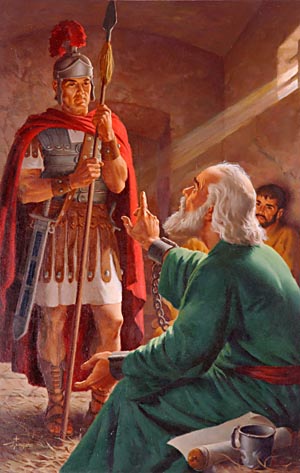The Acts of the Apostles
by Ellen G. White
Chapter 46: At Liberty
 |
 |
|
Paul had been placed in charge of the captain of the imperial guards by whose clemency he was left comparatively free to pursue the work of the gospel.
Illustration ©
Pacific Press Publ. Assoc. |
|
While Paul's labors in Rome were being blessed to the conversion
of many souls and the strengthening and encouragement of the believers, clouds
were gathering that threatened not only his own safety, but also the prosperity
of the church. On his arrival in Rome he had been placed in charge of the
captain of the imperial guards, a man of justice and integrity, by whose
clemency he was left comparatively free to pursue the work of the gospel. But
before the close of the two years' imprisonment, this man was replaced by an
official from whom the apostle could expect no special favor. {AA 485.1}
The Jews were now more active than ever in their efforts
against Paul, and they found an able helper in the profligate woman whom Nero
had made his second wife, and who, being a Jewish proselyte, lent all her
influence to aid their murderous designs against the champion of Christianity. {AA 485.2}
Paul could hope for little justice from the Caesar to whom
he had appealed. Nero was more debased in morals, [486] more
frivolous in character, and at the same time capable of more atrocious cruelty,
than any ruler who had preceded him. The reins of government could not have
been entrusted to a more despotic ruler. The first year of his reign had been
marked by the poisoning of his young stepbrother, the rightful heir to the
throne. From one depth of vice and crime to another, Nero had descended, until
he had murdered his own mother, and then his wife. There was no atrocity which
he would not perpetrate, no vile act to which he would not stoop. In every
noble mind he inspired only abhorrence and contempt. {AA 485.3}
The details of the iniquity practiced in his court are too
degrading, too horrible, for description. His abandoned wickedness created
disgust and loathing, even in many who were forced to share his crimes. They
were in constant fear as to what enormities he would suggest next. Yet even
such crimes as Nero's did not shake the allegiance of his subjects. He was
acknowledged as the absolute ruler of the whole civilized world. More than
this, he was made the recipient of divine honors and was worshiped as a god. {AA 486.1}
From the viewpoint of human judgment, Paul's condemnation
before such a judge was certain. But the apostle felt that so long as he was
loyal to God, he had nothing to fear. The One who in the past had been his protector
could shield him still from the malice of the Jews and from the power of
Caesar. {AA 486.2}
And God did shield His servant. At Paul's examination the
charges against him were not sustained, and, contrary to the general
expectation, and with a regard for justice [487] wholly
at variance with his character, Nero declared the prisoner guiltless. Paul's
bonds were removed; he was again a free man. {AA 486.3}
Had his trial been longer deferred, or had he from any cause
been detained in Rome until the following year, he would doubtless have
perished in the persecution which then took place. During Paul's imprisonment
the converts to Christianity had become so numerous as to attract the attention
and arouse the enmity of the authorities. The anger of the emperor was
especially excited by the conversion of members of his own household, and he
soon found a pretext to make the Christians the objects of his merciless
cruelty. {AA 487.1}
About this time a terrible fire occurred in Rome by which
nearly one half of the city was burned. Nero himself, it was rumored, had
caused the flames to be kindled, but to avert suspicion he made a pretense of
great generosity by assisting the homeless and destitute. He was, however,
accused of the crime. The people were excited and enraged, and in order to
clear himself, and also to rid the city of a class whom he feared and hated,
Nero turned the accusation upon the Christians. His device succeeded, and
thousands of the followers of Christ—men, women, and children—were
cruelly put to death. {AA
487.2}

Find out more today how to purchase a
hardcover or
paperback
copy of The Acts of the Apostles.
|
|
From this terrible persecution Paul was spared, for soon
after his release he had left Rome. This last interval of freedom he diligently
improved in laboring among the churches. He sought to establish a firmer union
between the Greek and the Eastern churches and to fortify the minds [488]
of the believers against the false doctrines that were creeping in to corrupt
the faith. {AA 487.3}
The trials and anxieties that Paul had endured had preyed
upon his physical powers. The infirmities of age were upon him. He felt that he
was now doing his last work, and, as the time of his labor grew shorter, his
efforts became more intense. There seemed to be no limit to his zeal. Resolute
in purpose, prompt in action, strong in faith, he journeyed from church to
church, in many lands, and sought by every means within his power to strengthen
the hands of the believers, that they might do faithful work in winning souls
to Jesus, and that in the trying times upon which they were even then entering,
they might remain steadfast to the gospel, bearing faithful witness for Christ.
{AA 488.1}
Click here to read the next chapter:
"The Final Arrest"
|



